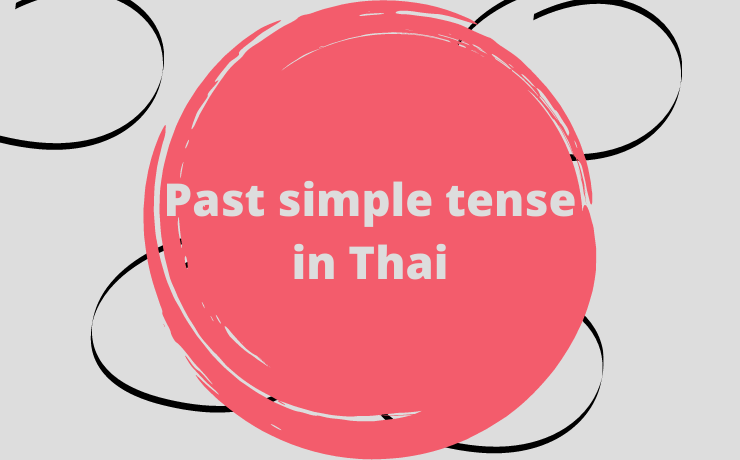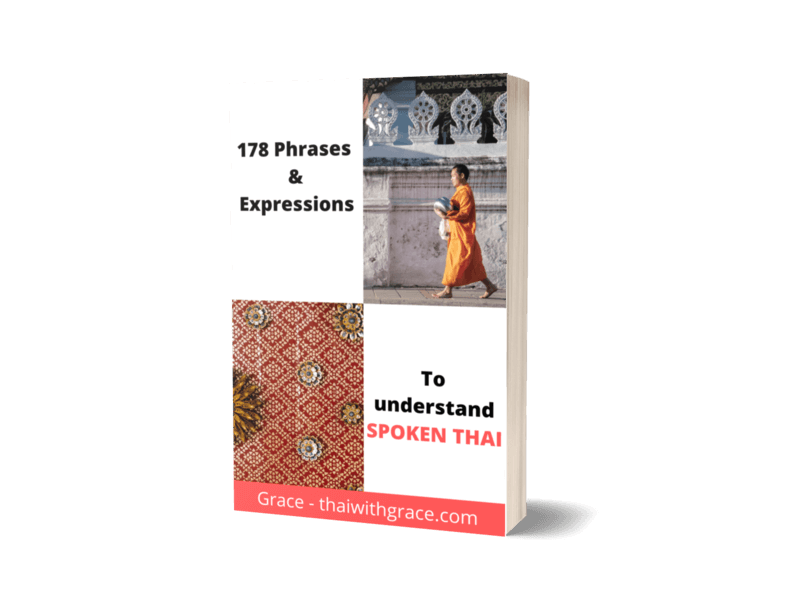There are no tenses in Thai like in English. Students always ask me: “if there are no equivalent tenses in Thai, how do we express the meaning we want to convey?”.
The answer is that although there are no tenses like in English there are few ways to express the past tense with the help of a few words and context.
First, let’s take a look at the English meaning of Past simple tense.

Completed action in the past
Here the simple past tense is used to express an action that started and finished already in the past. It can be one action or series of actions. In Thai, the “past tense” is indicated thanks to the time words (yesterday, last year, last month, etc).
- Yesterday, I went to school.
เมื่อวาน ฉันไปโรงเรียน
mêua waan · chăn bpai rohng rian - Last year, I traveled to Colombia.
ปีก่อนฉันไปเที่ยวประเทศโคลัมเบีย
bpee gòn chăn bpai tîeow bprà-tâyt koh-lam-bia - Last time I saw you, you were so still young.
ครั้งก่อนที่เจอกันยังเด็กๆอยู่เลย
kráng gòn têe jer gan yang dèk dèk yòo loie - Last month I bought a phone, packed it, and sent it to Thailand.
เดือนก่อนฉันซื้อมือถือ เพ็คใส่กล่องแล้วก็ส่งไปประเทศไทย
deuan gòn chăn séu meu tĕu · pék sài glòng láew gôr sòng bpai bprà-tâyt tai
In English, even if the speaker doesn’t state the exact time (though he/she has one specific time in mind), we can know that it’s in the past thanks to the tenses. But in Thai, we won’t know unless you use the word แล้ว which mean “already”
- I took a bath
อาบน้ำแล้ว
àap náam láew - I finished my homework
ทำการบ้านเสร็จแล้ว
tam gaan bâan sèt láew - I understood what you are saying
ฉันเข้าฉันสิ่งที่คุณพูดแล้ว
chăn kâo chăn sìng têe kun pôot láew - I already washed the dishes, cleaned the house, and put the kids to bed.
ฉันล้างจาน ทำความสะอาดบ้าน แล้วก็ ส่งลูกๆเข้านอนแล้ว
chăn láang jaan · tam kwaam sà-àat bâan láew gôr sòng lôok lôok kâo non láew
Duration in the past
Simple past tense can be used to talk about a duration which started and finished in the past. Here ‘duration’ indicates an event that is longer than an ‘action’. In English, this is often expressed such as for five years, for 10 minutes, all night, all day, all year, etc.
In Thai, we often use the word เคย (koie) to talk about past experiences. เคย is often translated to ‘used to’, ‘have been’ etc. By adding the word like …ที่แล้ว tee láew (…ago, …before) and แล้ว láew (already) we can express the past tense.
- I lived in Brazil for two years.
ฉันเคยอยู่ประเทศบราซิล 2 ปี
chăn koie yòo bprà-tâyt braa-sin sŏng bpee - I worked for 2 years here 10 years ago.
10 ปีที่แล้ว ฉันเคยทำงานที่นี่ 2 ปี
sìp · bpee-têe-láew · chăn koie tam ngaan têe nêe - I waited for you 10 minutes already.
ฉันรอเธอ 10 นาทีแล้ว
chăn ror ter · sìp · naa-tee láew
Past habits
Simple past tense is used when talking about past habits such as “I learned guitar when I was young”. This is an equivalent to “used to”. Therefore you can also say “I used to learn guitar when I was young”.
As mentioned previously in the last section, เคย (koie) is equivalent to “used to, have been” and can be used when talking about past experiences.
- I used to learn guitar when I was young.
ตอนเด็กๆฉันเคยเรียนกีต้า
dton dèk dèk chăn koie rian gee dtâa - In the past, I used to play piano.
เมื่อก่อนเคยเล่นเปียโน
mêua gòn koie lâyn bpia noh - I have never been to school (= I never used to go to school).
ฉันไม่เคยไปโรงเรียน
chăn mâi koie bpai rohng rian - Sometime ago she used to work in a hospital
เมื่อก่อนเธอเคยทำงานในโรงพยาบาล
mêua gòn ter koie tam ngaan nai rohng pá-yaa-baan
To summarize, notice how in English, words have the “ed” at the end (“finished”, “washed”), or change from “go” to “went”, etc to indicate the past.
In Thai, the words never change. You just add words to indicate what you are trying to say. For example, including the date to indicate when it happened in the past, แล้ว láew – meaning already, เคย koie meaning “used to”, “have been”, etc.
I hope you now understand the past tense in Thai language.
To learn about active voice and passive voice, please check out my article.

